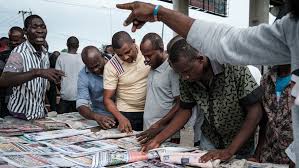APA – Lagos (Nigeria)
The World Bank report that says that Diaspora remittance into Nigeria is expected to exceed $20bn by the end of the year as total remittances into the Sub-Saharan Africa region increase by 1.9 per cent is one of the trending stories in Nigerian newspapers on Wednesday.
The Punch reports that the World Bank has said that Diaspora remittance into Nigeria is expected to exceed $20bn by the end of the year as total remittances into the Sub-Saharan Africa region increase by 1.9 per cent.
This was revealed in the World Bank’s latest Migration and Development Brief released this month, which stated that the global remittance flows would continue to grow in 2023 although at a slower pace.
The reports said, “Remittances to Sub-Saharan Africa are estimated to grow by 1.9 per cent from $53bn in 2022 to $54bn in 2023. Projections indicate that remittances to the region will keep increasing, to $55bn by 2024. The slowed growth in remittances observed in 2023 is explained by the slow pace of growth in the high-income economies where many Sub-Saharan African migrants earn their income.
“Remittances to Nigeria, accounting for 38 per cent of remittance flows to the region, grew by about two per cent, while two other major recipients, Ghana and Kenya, posted estimated gains of 5.6 per cent and 3.8 per cent, respectively.”
It was also revealed that fixed exchange rates and capital controls were diverting remittances to the region from official to unofficial channels.
“In 2024, remittance flows to the region are projected to increase by 2.5 per cent. Remittances from the United States have remained stable. Although the euro area has recovered, its output remains 2.2 per cent below pre-pandemic projections,” it added.
The newspaper says that costs of intercity bus travel jumped by 61.27 per cent in November when compared to the same period in the prior year, according to the National Bureau of Statistics.
The NBS Transport Fare Watch report, obtained by our correspondent, indicated that the cost of intercity bus travel soared to N6,206.53 per drop in November, compared to the previous year’s N3,848.48
The report stated, “The average fare paid by commuters for bus journey intercity per drop was N6,206.53 in November 2023, indicating an increase of 5.45 per cent on a month-on-month basis compared to N5,885.68 in October 2023.
“On a year-on-year basis, the fare rose by 61.27 per cent from N3,848.48 in November 2022.”
Furthermore, the report noted that the average fare paid by commuters for bus journeys within the city per drop declined by 6.23 per cent from N1,117.30 in October to N1,047.63 in November.
However, on a year-on-year basis, it rose by 64.44 per cent from N637.10 in November 2022.
On air travel, it stated that the average fare paid by air passengers for specified routes for a single journey was N81,334.05 in November, showing an increase of 3.24 per cent compared to the previous month.
On a year-on-year basis, the fare rose by 11.01 per cent from N73,270.27 in November of the prior year.
The Guardian reports that Senator Mohammed Ali Ndume has urged President Bola Tinubu and the Economic Community of West African States (ECOWAS) to lift economic, trade and other sanctions on Niger Republic.
According to him, the five-month sanctions are seriously affecting the people of Niger, instead of the Gen. Abdourahamane Tchiani-led military government.
Ndume made the call, yesterday, at his Government Reserved Area (GRA) residence, in Maiduguri, Borno State, while lamenting the sanctions on the 26 million people of the French-speaking West African country.
Beside the economic hardships in Niger, the people in the border areas of Kano, Zamfara, Borno, Katsina, Sokoto, Jigawa, Kebbi and Yobe states, in Nigeria, are also seriously affected with the economic and trade sanctions.
He asserted that sanctions should rather be placed on the Tchiani junta that unlawfully toppled the democratically elected government of President Mohamed Bazoum on July 26, 2023.
“The decision of ECOWAS to place economic sanctions on Niger was, however, rushed, instead of the National Assembly to dialogue with the junta,” he said, warning that about 100,000 displaced persons from Abadam, Guzamala and Mobbar local councils were taking refuge in Diffa Province for over a decade.
Ndume, therefore, called on Tinubu to negotiate with Tchiani by sending four former military heads of state, including retired Generals Yakubu Gowon, Abubakar Abdulsalami, Muhammadu Buhari and Ibrahim Babangida.
He said the diplomatic negotiations could also retain the “respect and dignity” Nigeria has with ECOWAS, African Union (AU) and the international community.
The newspaper reports that President Bola Tinubu has declared that the federal and sub-national governments have the mutual responsibility of ensuring peace and stability nationwide.
Speaking during a meeting with Nigeria Governors’ Forum (NGF) at his residence in Lagos, yesterday, the President reiterated his condemnation of the latest killings in Plateau State.
He issued a stern directive to security agencies to halt the carnage in Plateau and intensify pursuit of those responsible for the recent tragic events in Bokkos and Barkin-Ladi council areas.
Condoling with the victims, Tinubu emphasised the sanctity of human life and called for a paradigm shift among those with contrary beliefs, cautioning them about the inevitable consequences of their actions. His words: “Nigeria needs peace and stability to move forward. Nigeria belongs to all of us, and we have to take care of it.”
The President acknowledged Governor Siminalayi Fubara, commending him for his efforts to peacefully resolve the political challenges in Rivers State.
“I thank you for your statesmanship. I listened to your broadcast and your emphasis on peace. It is only with peace that effective governance can thrive, and governance has commenced in earnest under my watch,” he said.
On the 2024 budget proposal before the National Assembly, Tinubu informed the governors that he had a review meeting earlier on certain elements in the Appropriation Bill with the Minister of Finance and Coordinating Minister of the Economy, Wale Edun, and Minister of Budget and Economic Planning, Atiku Bagudu.
GIK/APA


